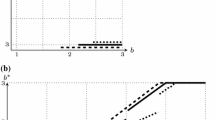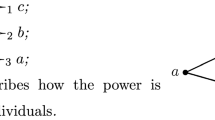Abstract
I analyze a stochastic bargaining game in which a renewable surplus is divided among n ≥ 5 committee members in each of an infinite number of periods, and the division implemented in one period becomes the status quo allocation of the surplus in the ensuing period. I establish existence of equilibrium exhibiting minimum winning coalitions, assuming sufficiently mild concavity of stage preferences. The analysis highlights the role of proposal power in committee deliberations and yields a fully strategic version of McKelvey’s (J Econ Theory 12:472–482, 1976; Econometrica 47:1086–1112, 1979) dictatorial agenda setting.
Similar content being viewed by others
References
Aliprantis CD, Border KC (1999) Infinite dimensional analysis: a hitchhiker’s guide, 2nd edn. Springer, New York
Banks J, Duggan J (2000) A bargaining model of collective choice. Am Polit Sci Rev 94: 73–88
Banks J, Duggan J (2006) A general bargaining model of legislative policy-making. Quart J Polit Sci 1: 49–85
Baron D (1996) A dynamic theory of collective goods programs. Am Polit Sci Rev 90: 316–330
Baron D, Ferejohn J (1989) Bargaining in legislatures. Am Polit Sci Rev 83: 1181–1206
Battaglini M, Coate S (2007) Inefficiency in Legislative Policy-Making: A Dynamic Analysis. Am Econ Rev 97: 118–149
Battaglini M, Palfrey T (2007) The dynamics of distributive politics. Social science working paper # 1273. California Institute of Technology
Bernheim D, Rangel A, Rayo L (2006) The power of the last word in legislative policy making. Econometrica 74: 1161–1190
Bowen R, Zahran Z (2009) On dynamic compromise. Working paper
Cho S-J (2005) A dynamic model of parliamentary democracy. Working paper
Diermeier D, Fong P (2009) Endogenous limits on proposal power. Working paper
Duggan J, Kalandrakis T (2007) A dynamic model of legislative bargaining. Wallis working paper no. 45
Epple D, Riordan M (1987) Cooperation and punishment under repeated majority voting. Public Choice 55: 41–73
Glicksberg I (1952) A further generalization of the Kakutani fixed point theorem with application to Nash equilibrium points. Proc Am Math Soc 3: 170–174
Gomez A, Jehiel P (2005) Dynamic processes of social and economic interactions: on the persistence of inefficiencies. J Polit Econ 113: 626–667
Kalandrakis T (2004) A three-player dynamic majoritarian bargaining game. J Econ Theory 116: 294–322
Kalandrakis T (2006) Proposal rights and political power. Am J Polit Sci 50(2): 441–448
Kalandrakis T (2007) Majority rule dynamics with endogenous status quo. Wallis working paper no. 46
Lagunoff R (2008) Markov equilibrium in models of dynamic endogenous political institutions. Unpublished manuscript
Lagunoff R (2009) The dynamic reform of political institutions. Games Econ Behav 67(2): 569–583
Maskin E, Tirole J (2001) Markov perfect equilibrium I: observable actions. J Econ Theory 100: 191–219
McKelvey R (1976) Intransitivities in multidimensional voting models. J Econ Theory 12: 472–482
McKelvey R (1979) General conditions for global intransitivities in formal voting models. Econometrica 47: 1086–1112
Merlo A, Wilson C (1995) A stochastic model of sequential bargaining with complete information. Econometrica 63: 371–399
Penn EM (2009) A model of farsighted voting. Am J Polit Sci 53(1): 36–54
Riker W (1962) The theory of political coalitions. Yale University Press, New Haven, CT
Rubinstein A (1982) Perfect equilibrium in a bargaining model. Econometrica 50: 97–110
Author information
Authors and Affiliations
Corresponding author
Rights and permissions
About this article
Cite this article
Kalandrakis, T. Minimum winning coalitions and endogenous status quo. Int J Game Theory 39, 617–643 (2010). https://doi.org/10.1007/s00182-009-0202-5
Accepted:
Published:
Issue Date:
DOI: https://doi.org/10.1007/s00182-009-0202-5




